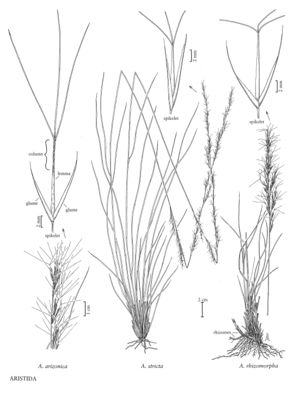Difference between revisions of "Aristida rhizomophora"
FNA>Volume Importer |
imported>Volume Importer |
||
| (4 intermediate revisions by 2 users not shown) | |||
| Line 3: | Line 3: | ||
|accepted_authority=Swallen | |accepted_authority=Swallen | ||
|publications= | |publications= | ||
| + | |special_status={{Treatment/ID/Special_status | ||
| + | |code=E | ||
| + | |label=Endemic | ||
| + | }} | ||
|basionyms= | |basionyms= | ||
|synonyms= | |synonyms= | ||
| Line 16: | Line 20: | ||
-->{{Treatment/Body | -->{{Treatment/Body | ||
|distribution=Fla. | |distribution=Fla. | ||
| − | |discussion=<p>Aristida rhizomophora is not well-collected. It is endemic to Florida, where it grows in moist to wet pine flatwoods, and on the borders of ponds and bald-cypress depressions.</p> | + | |discussion=<p><i>Aristida rhizomophora</i> is not well-collected. It is endemic to Florida, where it grows in moist to wet pine flatwoods, and on the borders of ponds and bald-cypress depressions.</p> |
|tables= | |tables= | ||
|references= | |references= | ||
| Line 25: | Line 29: | ||
-->{{#Taxon: | -->{{#Taxon: | ||
name=Aristida rhizomophora | name=Aristida rhizomophora | ||
| − | |||
|authority=Swallen | |authority=Swallen | ||
|rank=species | |rank=species | ||
| Line 32: | Line 35: | ||
|basionyms= | |basionyms= | ||
|family=Poaceae | |family=Poaceae | ||
| − | |illustrator=Linda A. Vorobik | + | |illustrator=Linda A. Vorobik;Andy Sudkamp |
| + | |illustration copyright=Utah State University | ||
|distribution=Fla. | |distribution=Fla. | ||
|reference=None | |reference=None | ||
|publication title= | |publication title= | ||
|publication year= | |publication year= | ||
| − | |special status= | + | |special status=Endemic |
| − | |source xml=https:// | + | |source xml=https://bitbucket.org/aafc-mbb/fna-data-curation/src/200273ad09963decb8fc72550212de541d86569d/coarse_grained_fna_xml/V25/V25_1021.xml |
|subfamily=Poaceae subfam. Aristidoideae | |subfamily=Poaceae subfam. Aristidoideae | ||
|tribe=Poaceae tribe Aristideae | |tribe=Poaceae tribe Aristideae | ||
Latest revision as of 17:55, 11 May 2021
Plants perennial; cespitose, with well-developed, thick, dark rhizomes. Culms 60-100 cm, erect, unbranched. Leaves mostly basal; sheaths longer than the internodes, glabrous, basal sheaths many-veined, shredding into threadlike segments at maturity; collars glabrous or sparsely pilose at the corners; ligules 0.1-0.2 mm; blades 10-55 cm long, 1-3 mm wide, flat to folded, glabrous, pale green to yellow-green, central veins separate and narrow, without a well-defined midrib, lateral veins forming a thickened region on each margin. Inflorescences paniculate, (10)20-45 cm long, 2-6 cm wide; nodes glabrous; primary branches (2)4-15 cm, basal branches appressed, without axillary pulvini, distal branches ascending, occasionally lax or drooping distally. Spikelets appressed. Glumes unequal, brown to chestnut, 1-veined, awned; lower glumes 6-12 mm, awns 2-5 mm; upper glumes 13-18 mm, awns 3-6 mm; calluses 0.4-0.8 mm; lemmas 9-13 mm long, narrowing to a poorly defined beak 1-2 mm long and 0.2—0.3 mm wide, glabrous, tan to brown, junction with the awns not conspicuous; awns usually unequal, not disarticulating at maturity; central awns 15-30 mm, curved to semicircular at the base, horizontal to reflexed distally; lateral awns 13-20 mm, at least 1/2 as long as the central awns, curved or loosely twisted at the base, straight and strongly divergent distally; anthers 3, about 4 mm, yellow. Caryopses 6-8 mm, tan to brown. 2n = unknown.
Discussion
Aristida rhizomophora is not well-collected. It is endemic to Florida, where it grows in moist to wet pine flatwoods, and on the borders of ponds and bald-cypress depressions.
Selected References
None.
